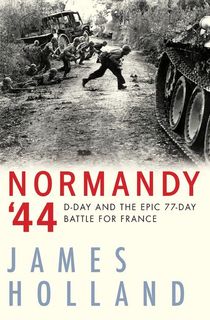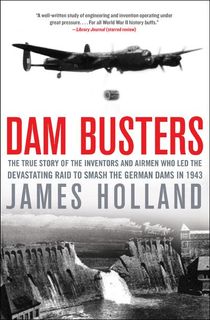While there’s no shortage of WWII history books out there for the dedicated reader, it’s important to be judicious when selecting your next read. The best history account will get all the facts straight, of course, but also recount them in a compelling way. That’s why we recommend checking out James Holland’s body of work: the author has gained a reputation as one of WWII’s finest historians. When you’re done perusing his best books, you can find more of his work on the BBC, and listen to his WWII podcast, We Have Ways of Making You Talk.

The Savage Storm
The Liberation of Italy was a massive operation that spanned years, from 1943 to 1945. The protracted campaign was made even more challenging by the fact that the Allies were simultaneously making covert preparations for D-Day, thereby diverting resources and manpower away from Italy. In James Holland’s latest, he delves into the many facets of the Italian Campaign, and the sacrifices made by both civilians and military personnel involved at every level of the operation. This comprehensive account of the conflict utilizes letters, diaries, and other documents from the Allies and Nazis alike to get an intimate sense of the fighting that would decide the future of Italy, and the war itself.

Sicily '43
To fully grasp how the Liberation of Italy unfolded, it’s vital to understand the role of Operation Husky, which set the stage for the rest of the campaign. This account focuses on the 38-day battle for Sicily, the first Allied attack on European soil—and a curiously underappreciated event in WWII history. The hard-fought battle saw conflicts take place on land, in the air, and at sea before the Allies wrested control of the island from the Axis powers. Holland’s book weaves various perspectives together for an incisive look at the invasion of Sicily and its achievements.

Normandy '44
In this sweeping account of D-Day and the bitter fighting that followed, “Mr. Holland effectively balances human drama with the science of war as the Allies knew it” (Wall Street Journal). Operation Overlord, the codename for the Battle of Normandy, was the first stage in the ambitious plan to take back control of Nazi-occupied Western Europe, beginning with France. This history book brings D-Day and the 77-day battle for France to vivid life with rich descriptions of strategic decisions and the men who made them, key adjustments made in real time, the experiences of soldiers on both sides, and more.

Brothers in Arms
The Sherwood Rangers started out as British cavalry, and the regiment was one of the last to ride horses into battle in modern military history. This moving account focuses on the Sherwood Rangers’ WWII service, when they made the transition to tanks and joined the fray in fronts as varied as North Africa and Nazi Germany itself. From D-Day to V-E Day, Holland traces this inspiring regiment by piecing together letters, photographs, and other never-before-seen documents treasured by the veterans’ families.

The Rise of Germany, 1939–1941
“A genuinely fresh approach” to WWII history, The Rise of Germany unearths new information about the early years of the war (The Wall Street Journal). Focusing not just on military strategy, but also on the economic, political, and social aspects of the war, this well-rounded account sheds light on Nazi Germany. It begins its coverage with the outbreak of the war and continues up until Operation Barbarossa, the Nazi invasion of Russia and a major turning point. For a gripping and incisive WWII read, look no further.

The Allies Strike Back, 1941–1943
The second book in Holland’s War in the West trilogy picks up where The Rise of Germany left off. As London was being bombed and the US declared war after Pearl Harbor, the Nazis were extending their sphere of influence with alarming speed. However, their rapid victories concealed weaknesses that the Allies would be able to exploit. The saga continues in this achievement of WWII storytelling.

Dam Busters
On May 16, 1943, three bombers set out from England with one very important mission: to destroy three hydroelectric dams that were powering the Nazi war machine. The entire mission and the bombs themselves—nicknamed Upkeep and Highball—were a stunning achievement of innovative technology and military strategy. In this “impeccably researched work in the style of a fast-paced techno-thriller,” Holland takes readers through the weapons program, its deployment, and the aftermath (Publishers Weekly).

Big Week
In February 1944, Allied air forces launched an around-the-clock bomber attack on Germany. The goal of Operation Argument, or “Big Week” as it came to be called, was to devastate the Luftwaffe ahead of D-Day. Delving into this pivotal week as well as aerial combat more broadly, this is a “fascinating must-read for World War II aficionados” (Kirkus Reviews, starred review). From fighter pilot cockpits to the chaos on the ground, this is an up-close look at soldiers and civilians alike as they were stretched to their limitations.
This post is sponsored by Grove Atlantic. Thank you for supporting our partners, who make it possible for The Archive to continue publishing the history stories you love.

